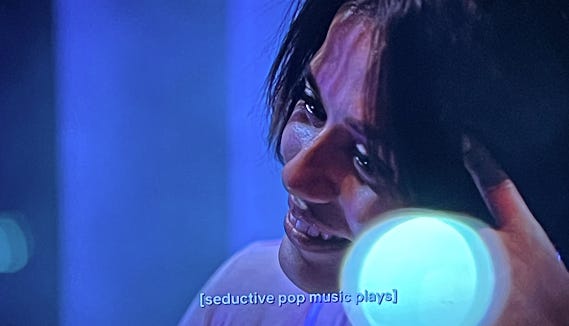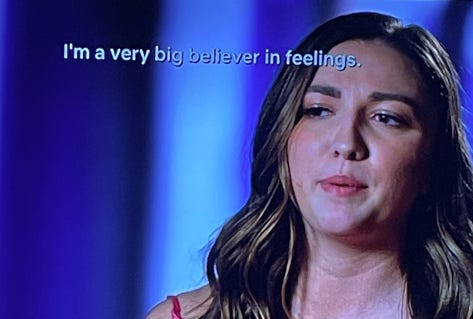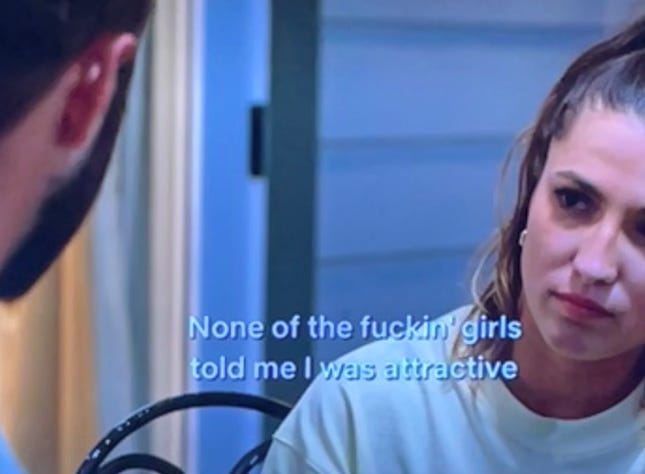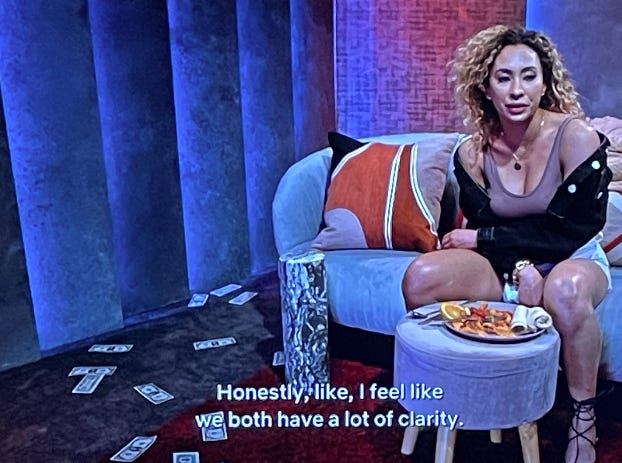What if…Love Is Blind as couples therapy?
The views are great from the IRL relationship high horse!!
Hi!
Have y’all watched Love Is Blind?
In case you're unfamiliar, the basic premise is that a bunch of conventionally attractive straight people go on “pod dates,” where they can’t see who's on the other side. These dates last hours, and the only way to escape is to propose/receive a proposal. If she says yes, the podlings meet face-to-face, immediately go on vacation, then have to live together while getting ready for the wedding, which is in an ungodly short amount of time. We’re talking weeks here. It’s hosted by America’s favorite sentient taper candles, Vanessa and Nick Lachey.
The other day, my brother asked me if the latest season is “good.” Of course it’s not good! It’s a flaming hellscape of humanity so contrived it goes all the way back around to being raw again. So why do we watch? Here, and in most other places, I’m going to be using “we” as in “my partner and me,” not “we” as in “society at large.” As much as I have noticed prior reality TV haters joining their partners in watching this show above other franchises, a few anecdotes do not make a trend!
In short, we watch because it’s very hard to deny a lizard-brain need to have our choices validated while cackling at a bunch of bozos with few redeeming qualities. Watching Love Is Blind is the opposite of scrolling through Instagram — it’s anti-aspirational, packed with a buffet of moments to make just about anyone feel like the most evolved and emotionally mature partner/friend/community member on planet Earth.
Last week, I spent a solid twenty minutes of my therapy session discussing the show, and am proud to report that my hypothesis that “this is a therapeutically rich text” is not incorrect. My therapist admitted that she too has watched the show and thinks there is a lot to glean about the in-pod relational power of setting realistic expectations, being vulnerable, and asking for what you want. I think there’s even more to take away: the meta-experience of watching with someone else.
Reality TV can be a mirror — for our culture, sure, but also for ourselves. Judgment is nothing but insecurity wearing a sexy little dress, which is bad news for the ten-minute rant I went on about why S3 Bartise is actually more nefarious than S2 Shake. But it’s excellent news for the conversations happening in my household. We’ve talked about things like trust, gender norms, family, being a person with needs, trad-wife societal expectations, how it’s completely healthy to be attracted to other people besides your partner, and how it’s absolutely not healthy to try to own your partner like an object or throw them under your family’s pro-life bus because their body is not pilates-ified enough for your taste.
We do all of this in front of the TV; strengthening our relationship while the podlings’ implode. My partner’s theory is that these relationships are doomed because everyone’s already blown their vulnerability load by the time they meet in real life — they don't build the uniquely strong bond that forms not just from expressing closely held feelings directly into the face of the person you care for, but also from physically supporting one another in those awkward and often scary moments immediately afterward. I mostly agree with this. However, my larger theory is that these relationships are doomed because no one’s having any fun.
There is — at least on camera — zero “just fucking around” time. I’m not sure about y’all, but every relationship in my life, romantic or otherwise, is built on more than raw trauma dumping. Of course, vulnerability is key, but so is a lot of time being silly little freaks together. I’m talking about the levity that comes from experiencing the mundane, often at its worst. My fondest relationship memories could not be produced by Netflix — they’re forged out of survivable chaos.
Like changing into matching CHICAGO: THE WINDY CITY t-shirts in the Eataly bathroom. Like choreographing our amateur vet tech routine on day three of cat tranquilizer medication somewhere off an Arizona highway. Like having a shared low-stakes nemesis (ours is a neighbor who sneezes at a theatrical volume). Like building a custom IKEA wardrobe unit. These things kind of suck in theory, but in hindsight, they’re what our love actually looks like.
It feels like many of the bros and bimbos on Love Is Blind wax poetic about fairy tales, without considering their defining features — underdeveloped characters and the “perfect” happy ending. But people are (or at least should be) multidimensional. We have needs. We have the capacity to change. We’re not owed any ending in life besides our own ultimate demise. It’s almost like the podlings think the only way to find “true love” is to live in storybook delusion. But what if all they really have to do is clown on a reality TV show while putting together some particleboard furniture? I mean, some self-work and community-building rooted in boundaries and reciprocity wouldn’t hurt here either.
But let’s not get ahead of ourselves here. Love is not blind, and it’s also not fast. You don’t go from “making racist comments about your partner to their face” to “discussing emotional labor in the IKEA parking lot” in a day. And that’s kind of the point.
This newsletter was brought to you by:
My partner, Reed, and his growing interest in awful television
Everyone from Green Bay, Wisconsin who gave me lukewarm tea/backstory on S2 podling and hometown (anti)hero, Shayne
Annie’s white cheddar shells with frozen peas
Watching at least two Hallmark-esque romcoms every weekend, as to make anything else look like god’s gift to media







everyone on this show likes the idea of love more than love itself 💀
also, thank you for sharing your relationship memories they are devastatingly cute to read as a single person
Totally enjoyed this!